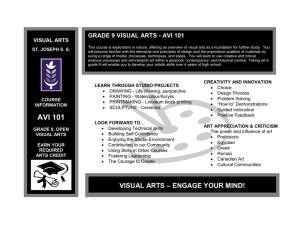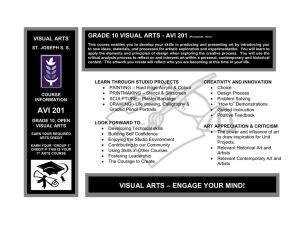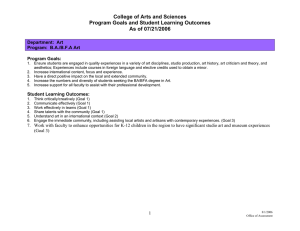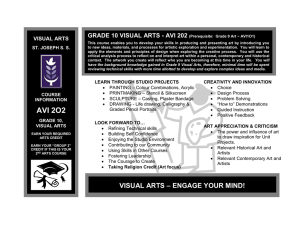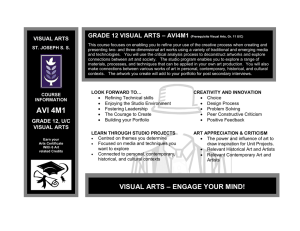Learning Goals: Studio Art Major
advertisement
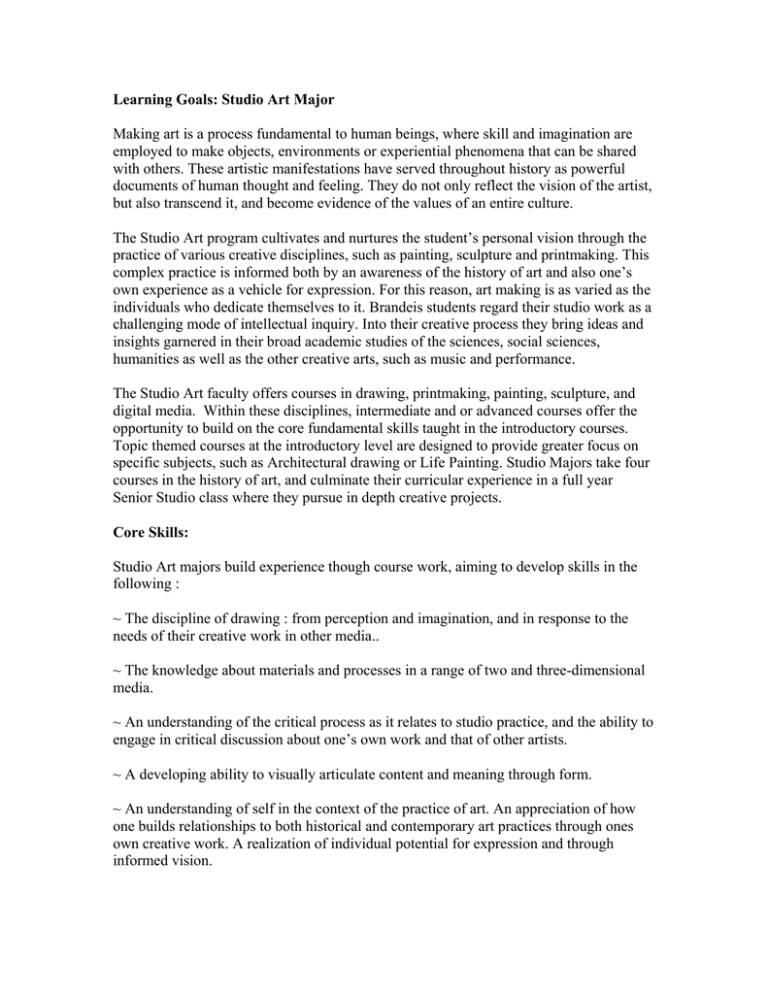
Learning Goals: Studio Art Major Making art is a process fundamental to human beings, where skill and imagination are employed to make objects, environments or experiential phenomena that can be shared with others. These artistic manifestations have served throughout history as powerful documents of human thought and feeling. They do not only reflect the vision of the artist, but also transcend it, and become evidence of the values of an entire culture. The Studio Art program cultivates and nurtures the student’s personal vision through the practice of various creative disciplines, such as painting, sculpture and printmaking. This complex practice is informed both by an awareness of the history of art and also one’s own experience as a vehicle for expression. For this reason, art making is as varied as the individuals who dedicate themselves to it. Brandeis students regard their studio work as a challenging mode of intellectual inquiry. Into their creative process they bring ideas and insights garnered in their broad academic studies of the sciences, social sciences, humanities as well as the other creative arts, such as music and performance. The Studio Art faculty offers courses in drawing, printmaking, painting, sculpture, and digital media. Within these disciplines, intermediate and or advanced courses offer the opportunity to build on the core fundamental skills taught in the introductory courses. Topic themed courses at the introductory level are designed to provide greater focus on specific subjects, such as Architectural drawing or Life Painting. Studio Majors take four courses in the history of art, and culminate their curricular experience in a full year Senior Studio class where they pursue in depth creative projects. Core Skills: Studio Art majors build experience though course work, aiming to develop skills in the following : ~ The discipline of drawing : from perception and imagination, and in response to the needs of their creative work in other media.. ~ The knowledge about materials and processes in a range of two and three-dimensional media. ~ An understanding of the critical process as it relates to studio practice, and the ability to engage in critical discussion about one’s own work and that of other artists. ~ A developing ability to visually articulate content and meaning through form. ~ An understanding of self in the context of the practice of art. An appreciation of how one builds relationships to both historical and contemporary art practices through ones own creative work. A realization of individual potential for expression and through informed vision. Knowledge. The Studio Art major will acquire the following types of knowledge: ~ Familiarity with materials and methods employed in the practice of art. The ability to apply techniques of various media in order to serve personal vision. ~ An in-depth study of one discipline/medium, in which to pursue advanced research during Senior year. Students should also be versed in various mediums beyond the chosen area of specialization, such as printmaking, drawing, or photography. ~ A broad understanding of the scope of art history from Ancient to Medieval, Renaissance to Impressionism, Modern and Contemporary, and Non-Western art. The ability to direct studio practice in an informed manner, stemming from a growing understanding of the history of art, theoretical and aesthetic concepts. ~ An exposure to contemporary visual arts culture through visiting artist lectures, visits to the Rose Art museum and field trips to New England and New York museums and galleries. ~ A knowledge of how to take personal risks in the process of intensifying visual intuition. The ability to select and exhibit one’s work. Social Justice: Through the practice of art making and the study of art history students will come to understand the cultural significance of art in society and the importance of selfexpression inside a community. Understanding how to interpret and communicate visually enables our students to bridge cultural divides and nurtures empathy and increased awareness of global situations. The social commitment of our students is evident in the subject matter they embrace in creative work: environmental problems, political issues or ideas about sexual identity. Their work not only documents social issues, but also promotes social change in site specific installations and performances intended to engage, provoke and inspire a community audience. Through the continued creation of art, students will be engaged in a lifelong process of self-reflection and inquiry that will challenge convention at either the individual or social level, or both. Upon Graduating: A Brandeis Studio Art major will be prepared to: ~ Pursue graduate study of art, in order to sustain their practice outside of an academic structure and possibly pursue the teaching of their discipline. ~ Apply knowledge to work in other professional art fields: in museums, galleries, arts organizations, arts publications, business. ~ Use the creative process as a guiding principle in other disciplines. Studio art majors have not only gone on to careers in creative art, design, and art history, but also have pursued graduate degrees in medicine, elementary education, social work and art therapy. ~ Contribute to contemporary discourse on art and world issues through the making of art.
